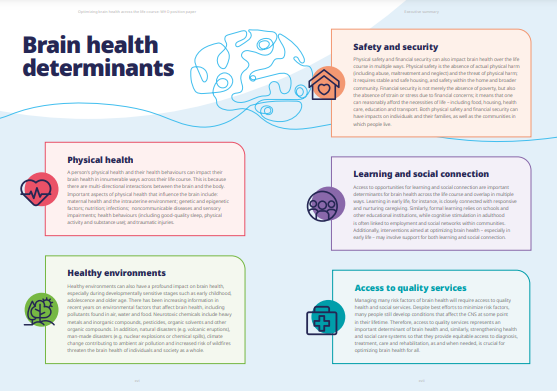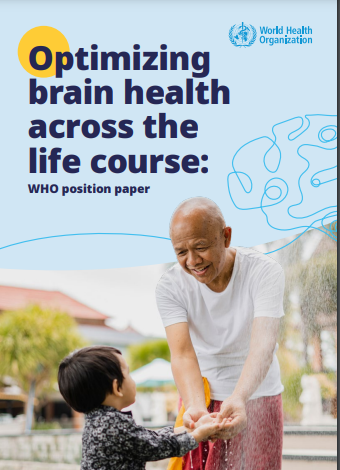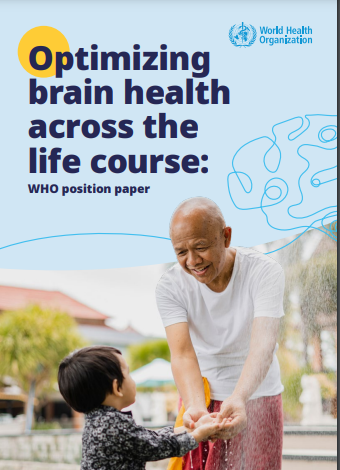Optimizing brain health across the life course: WHO Position Paper
WHO
Dr REN Minghui
Assistant Director General Universal Health Coverage/Communicable and Noncommunicable Diseases
August 2022
Key messages summarized by:
Joaquim Cardoso MSc.
The Health Transformation — institute for research and strategy
Brain Health Unit
August 9, 2022
What is the problem?
- Neurological disorders led by stroke, migraines, dementia and meningitis are currently the number one cause of disability globally.
- Neurological disorders are the second leading cause of death, responsible for 9 million deaths per year.
- In 2017, 43% of children under the age of 5 years in low- and middle-income countries (nearly 250 million children) were at risk of not reaching their developmental potential due to extreme poverty and stunting.
- The costs of inaction are high, with the financial losses alone for this missed developmental potential projected to be around 26% lower annual earnings in adulthood.
What are the causes?
- Too few countries globally have family-friendly policy protections in place with the aim of safeguarding child brain development, such as programmes to offer tuition-free pre-primary school education, legislation to support breastfeeding, or paid maternity and paternity leave.
- Additionally, growing hazards from environmental pollutants imperil brain health globally.
What are the trends for the future?
- Global trends over the past three decades — largely driven by worldwide demographic changes and population ageing — suggest that these numbers will only increase.
- Nearly one in three people globally will develop a neurological disorder at some point in their lifetime, which means that virtually all readers of this paper will be touched by neurological disorders, either directly or indirectly.
- Further, the financial costs of neurological disorders are enormous, with common neurological disorders accounting for US$789 billion in the United States of America alone.
What is the call?
- World Health Organization (WHO) worked with a group of international experts, including disorders, to develop a position paper on optimizing brain health across the life course through an iterative process of desk reviews, consultations and peer review.
- The position paper provides a conceptual framework of brain health and brain health optimization (see Box 1).


Optimizing brain health across the life course: WHO position paper [Executive Summary]
9 August 2022
Introduction
Brain health is an evolving concept that is attracting increasing attention not only from the health sector but also from wider society, stimulating rich debate — and for good reasons.
The brain and central nervous system (CNS) are widely recognized as the command centre of the human body, controlling both conscious and unconscious body functions and thereby influencing every aspect of life.
If our brains are challenged by disease or other factors, this poses significant risks not only to the individual’s overall health and well-being but also global development and productivity.
Optimizing brain health, on the other hand, can lead to a wide array of benefits for the individual and society.
One way to stress the importance of optimizing brain health is to quantify the impacts of missed developmental potential in children which lead to cycles of poverty and health inequities.
For example, in 2017, 43% of children under the age of 5 years in low- and middle-income countries (nearly 250 million children) were at risk of not reaching their developmental potential due to extreme poverty and stunting.
The costs of inaction are high, with the financial losses alone for this missed developmental potential projected to be around 26% lower annual earnings in adulthood.
Moreover, too few countries globally have family-friendly policy protections in place with the aim of safeguarding child brain development, such as programmes to offer tuition-free pre-primary school education, legislation to support breastfeeding, or paid maternity and paternity leave.
For example, in 2017, 43% of children under the age of 5 years in low- and middle-income countries (nearly 250 million children) were at risk of not reaching their developmental potential due to extreme poverty and stunting.
The costs of inaction are high, with the financial losses alone for this missed developmental potential projected to be around 26% lower annual earnings in adulthood.
Additionally, growing hazards from environmental pollutants imperil brain health globally.
For example, WHO estimates that 99% of all people worldwide breathe polluted air in their ambient environment, which poses grave threats to brain development in early life and brain health across the life course.
Other compelling arguments for optimizing brain health throughout our lives are the morbidity and mortality caused by neurological disorders worldwide.
Neurological disorders led by stroke, migraines, dementia and meningitis are currently the number one cause of disability globally.
In addition, neurological disorders are the second leading cause of death, responsible for 9 million deaths per year.
Global trends over the past three decades — largely driven by worldwide demographic changes and population ageing — suggest that these numbers will only increase.
- Nearly one in three people globally will develop a neurological disorder at some point in their lifetime, which means that virtually all readers of this paper will be touched by neurological disorders, either directly or indirectly.
- Further, the financial costs of neurological disorders are enormous, with common neurological disorders accounting for US$789 billion in the United States of America alone.
Global trends over the past three decades — largely driven by worldwide demographic changes and population ageing — suggest that these numbers will only increase.
Unfortunately, global action on brain health is grossly insufficient.
Despite growing threats to brain health, there is limited policy response to address brain health comprehensively and there are inadequate services to promote and optimize brain health for people with lived experience.
Regardless of the huge global burden, access to services and support are both inadequate and unevenly distributed across country income brackets and between urban and rural areas within countries.
Numerous barriers to accessing timely and responsive services for neurological disorders exist globally, including the limited number of health workers with neurology specific training in lower-resource settings.
For example, there is a 70-fold difference in the availability of neurologically-trained workforce between high-income countries and low-income countries.
Additional barriers to accessing services include limited social and financial protections for people with neurological disorders, lack of access to medicines and diagnostics, as well as stigma and discrimination.
World Health Organization (WHO) worked with a group of international experts, including disorders, to develop a position paper on optimizing brain health across the life course through an iterative process of desk reviews, consultations and peer review.
The position paper provides a conceptual framework of brain health and brain health optimization (see Box 1).

Dr REN Minghui
Assistant Director General Universal Health Coverage/Communicable and Noncommunicable Diseases
Suggested citation.
Optimizing brain health across the life course: WHO position paper. Geneva: World Health Organization; 2022. Licence: CC BY-NC-SA 3.0 IGO; https://creativecommons.org/ licenses/by-nc-sa/3.0/igo/.
https://www.who.int/publications/i/item/9789240054561
Acknowledgements
This position paper was developed by the Brain Health Unit of the World Health Organization (WHO), under the overall supervision and guidance of Tarun Dua and Dévora Kestel.
The paper was written by Kavitha Kolappa and Katrin Seeher of the WHO Brain Health Unit, with substantial inputs from the following WHO Brain Health Unit colleagues (in alphabetical order):
Elaine Brohan; Rodrigo Cataldi; Vanessa Cavallera; Jorge Castro; Neerja Chowdhary; Batool Fatima; Stéfanie Fréel; Laura Garcia Diaz; Gergana Manolova; Nicoline Schiess; Chiara Servili; and Jessica Spagnolo.












